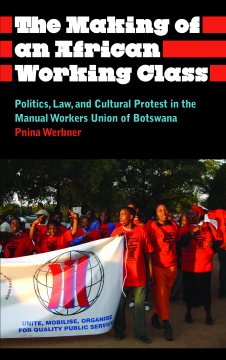
Additional Information
Book Details
Abstract
It is now 50 years since E.P. Thompson published his classic, The Making of the English Working Class. The Making of an African Working Class follows Thompson in exploring the formation of working class identity among low-paid African workers. In arguing for a radical public anthropology of worker identity, the book seeks to analyse the cultural, legal, ideological and experiential dimensions of labour activism often neglected in other labour studies.
Pnina Werbner shows that by fusing cosmopolitan and local popular cultural forms of protest, unionists have created a distinctive, vernacular way of being a worker in Botswana: one that does not deny workers' roots at home or in the countryside, while being cognisant of a wider world of cosmopolitan labour rights. The assertion of working class dignity, honour and respect, Pnina argues, is a powerful motivating force for manual workers.
Against legal-sceptical approaches, The Making of an African Working Class argues that in challenging the government - their employer - in court, manual workers' protests and mobilisation are deeply embedded in ethics, social justice and the law.
'[A] masterful ethnography ... Werbner has produced a theoretically sophisticated and thoroughly researched account of the uneven rise of
working-class consciousness and activism in Botswana'
American Ethnologist
'Shows how dignity, justice and morality underlay the resurgence of the Manual Workers' Union. A formidable achievement'
Professor Robin Cohen, Department of International Development, University of Oxford
Table of Contents
| Section Title | Page | Action | Price |
|---|---|---|---|
| Contents\r | vii | ||
| List of Figures\r | viii | ||
| List of Abbreviations\r | ix | ||
| Series Preface\r | xi | ||
| Preface\r | xii | ||
| 1. Introduction | 1 | ||
| 2. A Labour Elite? Strategising Women and the Spectre of Unemployment\r | 19 | ||
| 3. Women, Leadership and the Dignity of Labour\r | 39 | ||
| 4. Lekgotla la Babereki, The Court of the Workers: The Trade Union as Public Forum\r | 60 | ||
| 5. 'Legitimate Expectations': Ethics, Law and Labotr Justice in the 1991 Strike\r | 75 | ||
| 6. The Politics of Infiltration: Factionalism and Party Politics\r | 96 | ||
| 7. This Land is Our Land: The 2005 Manual Workers' Union Grand Tour of Botswana\r | 113 | ||
| 8. Solidarity Forever: Mobilising the Trade Union Movement in Prayer and Protest\r | 131 | ||
| 9. Winning Against the Odds: Speaking Truth to Power and Dilemmas of Charismatic Leadership\r | 150 | ||
| 10. 'The Mother of All Strikes': Popular Protest Culture and Vernacular Cosmopolitanism in the Public Service Unions' Strike, 2011\r | 169 | ||
| 11. The Politial and Moral Economy of the 2011 Strike: Public Rhetoric, Co\rnflict and Policy | 206 | ||
| 12. Legal Mobilisation, Legal Scepticism and the Politics of Public Sector Unions\r | 225 | ||
| 13. Concluding Remarks: Class Identity, Dignity and the Agency of Labour in Botswana | 253 | ||
| Appendix: Further Grievance Cases Settles by Lilian MaMoshe\r | 257 | ||
| Notes\r | 260 | ||
| References\r | 277 | ||
| Index\r | 294 |
